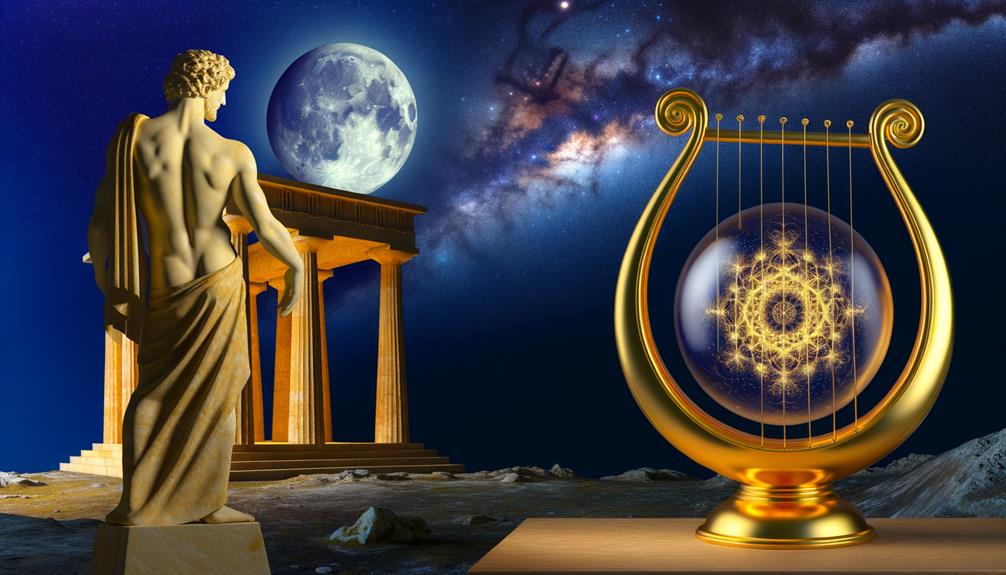Apollo, the god of music from Greek mythology, was a maestro like no other. His skills with the lyre weren't just for show. They were a divine gift that could influence the emotions of both gods and humans, and even control the rhythm of the universe itself.
He was also the god of prophecy, a role that made him the bearer of divine wisdom and insight. His words had the power to shape the future. But what really piques my interest is the deep link between Apollo's music and prophecy. This connection is a subtle part of ancient Greek culture and beliefs.
It's fascinating to think about how these two different skills could be intertwined and enhance each other in the world of the gods. So, get ready for an exciting trip into the core of ancient myths and tunes, where prophecy is a song and music predicts the future.
Apollo's Musical Prowess
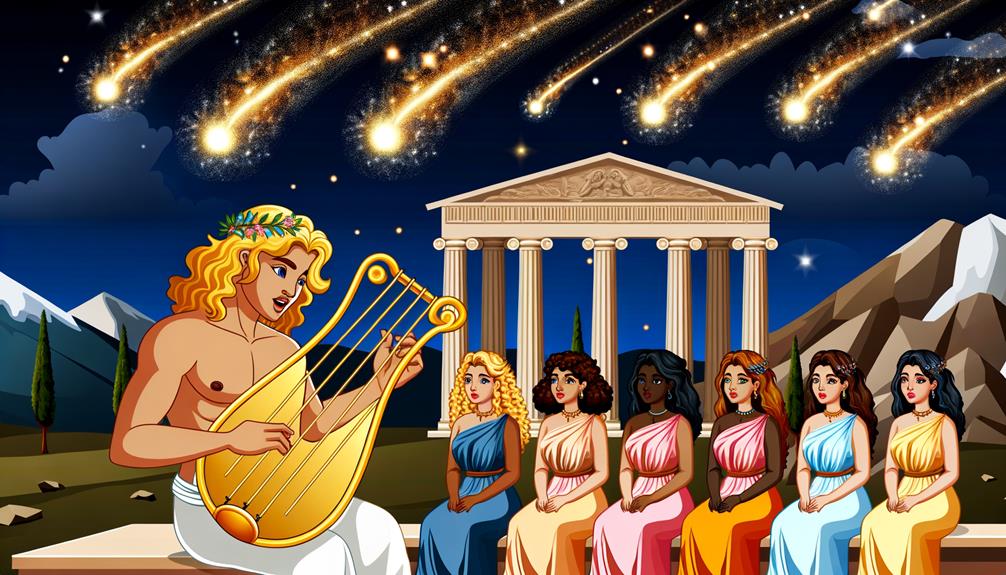
Apollo, the Greek God of music, is usually shown holding a golden lyre, a testament to his proficiency in this soothing art form. Apollo was renowned for his musical abilities, celebrated as the champion of both musicians and poets. His talent shone not only through the serene tunes that were said to alleviate pain, but also in his novel approach to string music. As the offspring of Zeus, Apollo had exceptional abilities, and music was one of the many divine gifts he possessed.
The music of Apollo had a healing effect, acting as a remedy for both bodily and emotional pain. His musical talent went beyond just providing entertainment, it also had a therapeutic role. But that's not all. As the Sun God, his music added joy to the lives of the Greeks and his impact reached even to the oracle of Apollo, where his ability to predict the future was highly respected.
The Pythian games, a festival of music and poetry held every four years, were a tribute to Apollo, showcasing his vital contribution to Greek culture. His ability to foresee the future, coupled with his musical skill, created an image of a God who wasn't just smart but also creative, a source of light and optimism for the ancient Greeks.
Prophecy: Apollo's Divine Gift
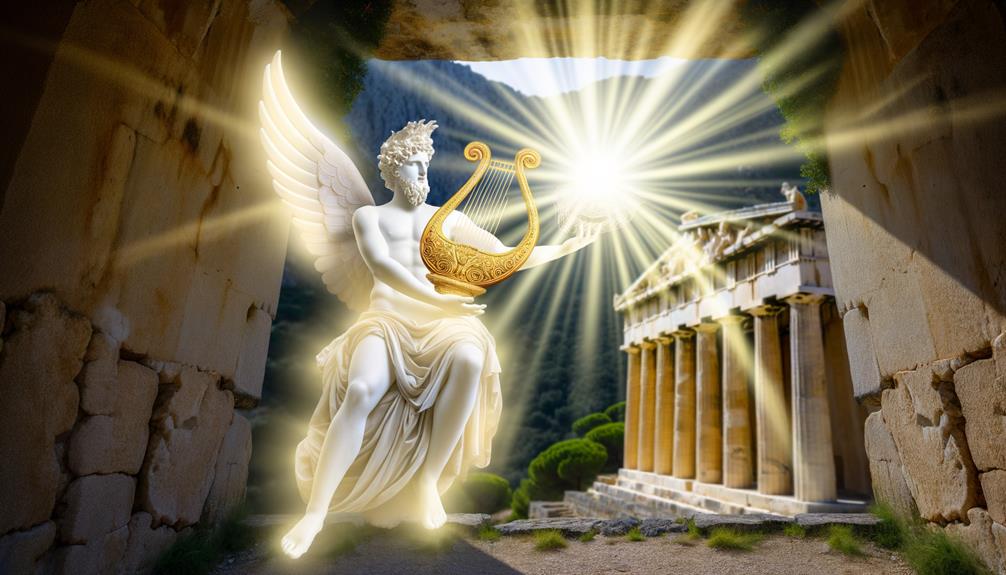
Apollo, the Greek god, was more than just a talented musician who shaped Greek culture. He was also known for his unique ability to foresee the future. This wasn't a skill only for the gods, but humans could benefit from it too. Apollo's gift was instrumental in founding cities and civilizations.
One of the key showcases of Apollo's predictive power was the Oracle of Delphi. The oracle, located in Apollo's temple, was famous not only in Greece but also attracted attention from Egyptians and Romans. People would seek Apollo's guidance for significant decisions. Apollo's oracle and his festivals had a major impact on Greek society, mirroring the most enlightened parts of the Greek mindset.
Art and classic literature are filled with depictions of Apollo and his sister, both respected gods. This highlights the crucial role Apollo played in Greek culture. So, Apollo's legacy, as a god of music and prediction, is still a vital part of Greek mythology.
Apollo's Influence on Greek Culture
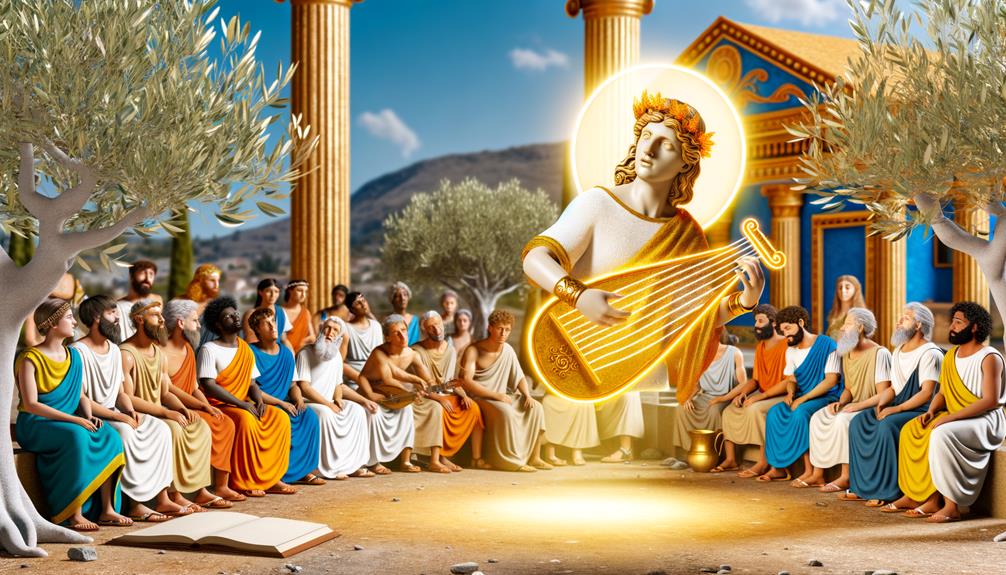
There's no denying that Apollo, the divine figure from Greek mythology, significantly influenced all aspects of Greek culture. His influence was everywhere, from city formation to the subtleties of classical literature and art. Apollo was the twin brother of Artemis, and a key figure in the ancient Greek perspective of the world. Throughout the Hellenistic period, he was worshipped with great respect.
Apollo's role in Greek culture can be seen in:
- The many temples built in his honor. This shows the deep respect Greeks had for this god.
- His position as the god of prophecy. His Oracle at Delphi served as a guiding light for Greek rulers making big decisions.
- His respect as the protector of livestock, which highlights the agricultural basis of Greek society.
- His integration into Roman religion, which shows how this Greek god's influence crossed cultural boundaries.
- His changing depiction in art, which reflects the dynamic nature of Greek and Roman aesthetic tastes.
Apollo's influence went beyond borders and time periods. It didn't just shape the Greek world, but also left lasting marks on Roman culture and beyond. Apollo's legacy in Greek culture serves as proof of the lasting power of myth and religion in shaping human societies.
Symbolism in Apollo's Myths
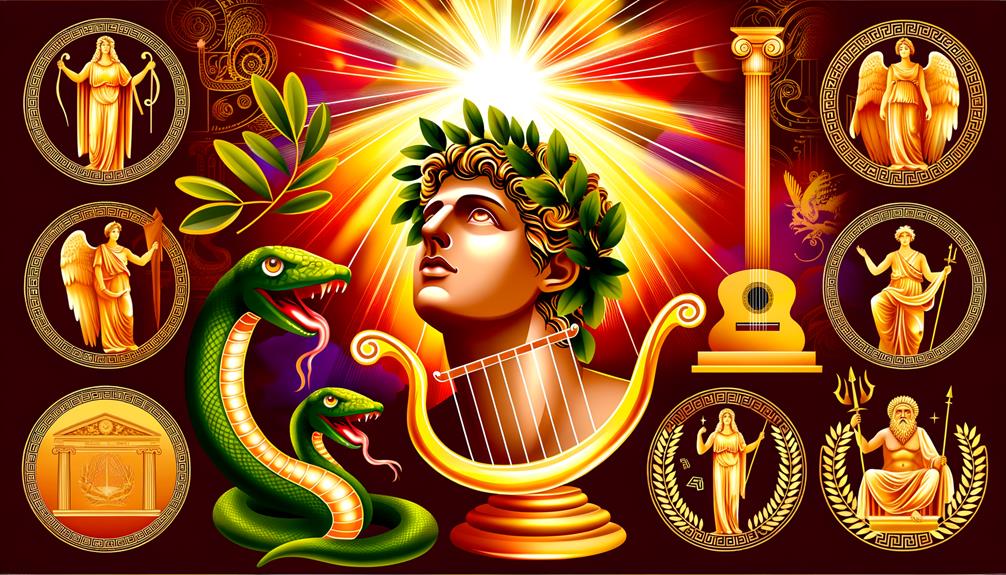
We've spent a good deal of time discussing Apollo's influence on Greek culture. Now, let's shift our focus to the rich symbolism woven into his myths, which shed further light on his various roles and abilities in Greek mythology.
As an example, Apollo's birth on Delos – being the son of Leto and the twin brother of Artemis – is a clear nod to his divine status.
Next, there's the story of Apollo's fight with Python, the creature guarding the oracle at Delphi. Here, Apollo's victory over the beast is a metaphor for his triumph over chaos. The laurel, which became his sacred plant after this battle, represents this victory. With this win, Apollo stepped into the role of Pythian Apollo, the sun god who lights up the world with truth and prophecy.
Apollo's win against Marsyas in a music contest brings more depth to this symbolism. The divine music from Apollo's lyre and his leadership over the Muses highlight his reign over the realms of art and intellect.
Art often shows Apollo Belvedere with glowing feet, demonstrating his close ties with light. His healing powers exhibit his compassionate nature. His punishment of Tityos, who disrespected Leto, emphasizes Apollo's role as a defender of moral order.
All these symbols from different myths combine to paint a complete picture of Apollo's complex personality, illustrating his broad influence on Greek society.
Interpreting Apollo's Oracle at Delphi
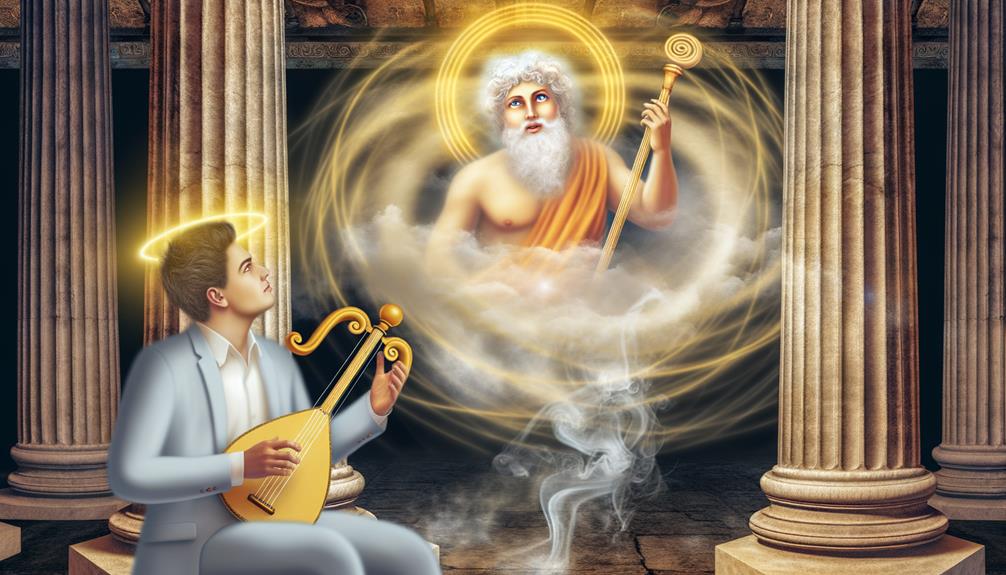
Digging into the understanding of Apollo's Oracle at Delphi, we uncover a fascinating connection between this respected fountain of divine knowledge and Apollo's mythical victory over Python. This Oracle, closely tied to Apollo, played a critical role in providing prophecy, advice, and wisdom in the ancient Greek era.
To truly understand Apollo's Oracle at Delphi, we need to grasp Apollo's characteristics and jobs, which include:
- His dominance in music, illustrated by his famous lyre.
- His control over prophecy and truth, represented by his golden bow and arrows.
- His association with healing, highlighting his broad influence.
- His close ties with various animals, which add depth to his divine character.
- His complicated romantic relationships, which give insights into Apollo's various interactions.
Residing within Apollo's temple, the Oracle at Delphi was a guiding light of divine knowledge. Interpreting the oracle's mysterious messages was a job for priests and later authors who understood the complex language of the divine. It's these written records that enable us to decipher the oracle's messages today.
Apollo was also recognized for his role in warding off evil, a feature that's reflected in the oracle's advice. Therefore, understanding 'Apollo's Music and Prophecy' is incomplete without the knowledge of his oracle at Delphi.
Frequently Asked Questions
What Is the Myth of Apollo Music?
Have you heard about the myth related to Apollo's music? It's a fascinating tale that gravitates around his exceptional talent for playing the lyre. One memorable instance of his skill was when he beat Marsyas in a musical face-off. The story takes a bit of a grim turn when, to assert his musical dominance, Apollo doles out a severe punishment – he flays Marsyas alive. Quite an intense story, wouldn't you agree?
What Is Apollo the God of Prophecy?
Apollo, recognized as the divine figure of prophecy, is celebrated for his enigmatic oracles, with Delphi being a prominent example. His talent in prophecy is exceptional, providing both divine beings and humans with invaluable insights. This unique skill of his has had a significant impact on Greek society, shaping its cultural fabric in many ways.
Who Is the God of Music and Prophecy?
Interestingly, the question itself reveals the answer. It's me, Apollo, the deity of music and prophecy. I'm celebrated for my eternal youth, exceptional talent in music, and the divine wisdom I share via my Oracle at Delphi.
Why Apollo Is Called as the God of Music?
So, you're curious why Apollo gets the title of the God of Music? Well, it's quite simple really. The guy was a whiz on the lyre, mastering it like no one else. People saw him as the guardian of music, and he's often praised for being the brains behind string music. On top of that, he's got the Muses under his wing, which only cements his reputation in the world of music. Cool, eh?
Conclusion
All in all, Apollo's knack for music and divination made quite a splash in Greek society.
It's pretty cool to think around 100,000 people each year would seek out advice from Apollo's Oracle at Delphi – showing just how much sway he held.
The blending of music and foresight in Apollo's story really speaks to the many roles he played as a god, and highlights the depth and intricate nature of Greek mythology.

